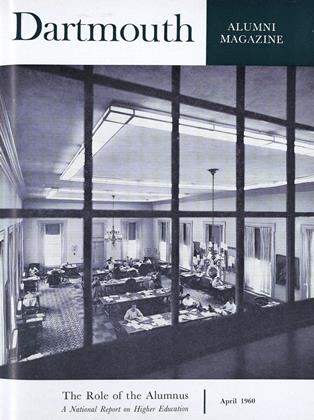PUBLICLY SUPPORTED educational institutions owe a special kind of debt to their alumni. Many people imagine that the public institutions have no financial worries, thanks to a steady flow of tax dollars. Yet they actually lead a perilous fiscal existence, dependent upon annual or biennial appropriations by legislatures. More than once, state and municipally supported institutions would have found themselves in serious straits if their alumni had not assumed a role of leadership.
A state university in New England recently was put in academic jeopardy because the legislature defeated a bill to provide increased salaries for faculty members. Then the university's "Associate Alumni" took matters into their hands. They brought the facts of political and academic life to the attention of alumni throughout the state, prompting them to write to their representatives in support of higher faculty pay. A compromise bill was passed, and salary increases were granted. Alumni action thus helped ease a crisis which threatened to do serious, perhaps irreparable, damage to the university.
In a neighboring state, the public university receives only 38.3 per cent of its operating budget from state and federal appropriations. Ninety-one per cent of the university's $l7 million physical plant was provided by private funds. Two years ago, graduates of its college of medicine gave $226,752 for a new medical center—the largest amount given by the alumni of any American medical school that year.
Several years ago the alumni of six state-supported institutions in a midwestern state rallied support for a $l50 million bond issue for higher education, mental health, and welfare—an issue that required an amendment to the state constitution. Of four amendments on the ballot, it was the only one to pass.
In another midwestern state, action by an "Alumni Council for Higher Education," representing eighteen publicly supported institutions, has helped produce a $13 million increase in operating funds for 1959-61—the most significant increase ever voted for the state's system of higher education.
SOME ALUMNI ORGANIZATIONS are forbidden to engage in political activity of any kind. The intent is a good one: to keep the organizations out of party politics and lobbying. But the effect is often to prohibit the alumni from conducting any organized legislative activity in behalf of publicly supported education in their states.
"This is unfair," said a state-university alumni spokesman recently, "because this kind of activity is neither shady nor unnecessary.
"But the restrictions—most of which I happen to think are nonsense—exist, nevertheless. Even so, individual alumni can make personal contacts with legislators in their home towns, if not at the State Capitol. Above all, in their contacts with fellow citizens—with people who influence public opinion—the alumni of state institutions must support their alma maters to an intense degree. They must make it their business to get straight information and spread it through their circles of influence.
"Since the law forbids us to organize such support, every alumnus has to start this work, and continue it, on his own. This isn't something that most people do naturally—but the education of their own sons and daughters rests on their becoming aroused and doing it."
The Beneficiaries Students on a state-university campus. Alumni support is proving invaluable in maintaining high-quality education at such institutions.
The Beneficiaries: Students on a state-university campus. Alumni support is proving invaluable in maintaining high-quality educationat such institutions.
 View Full Issue
View Full Issue
More From This Issue
-
 Feature
FeatureThe TPC Planning Program
April 1960 By FRANK SMALLWOOD '51 -
 Feature
FeatureEverything But Little Dogies
April 1960 By WARREN BLACKSTONE '62, PETE BOSTWICK '63 -
 Feature
FeatureTHE ALUMNUS/A
April 1960 -
 Article
ArticleWinter Sports
April 1960 By CLIFF JORDAN '45 -
 Article
ArticleTHE COLLEGE
April 1960 -
 Class Notes
Class Notes1951
April 1960 By LOYE W. MILLER, JAMES V. ROBINSON








